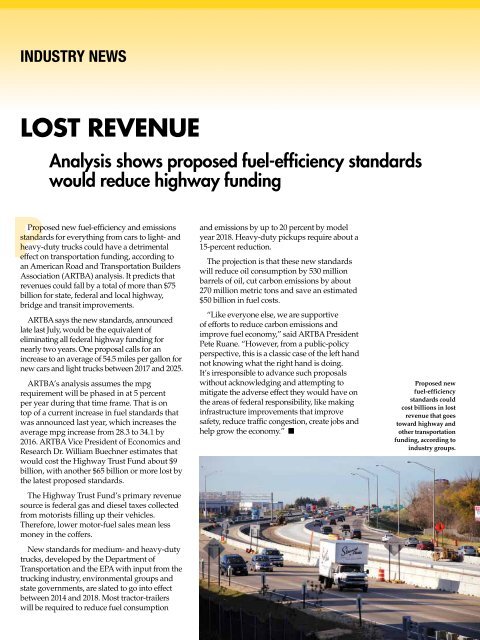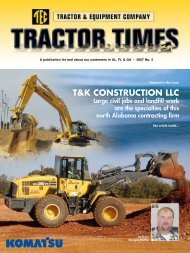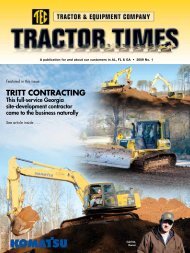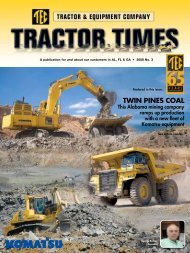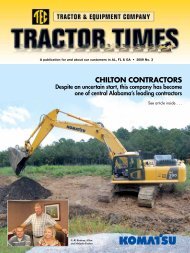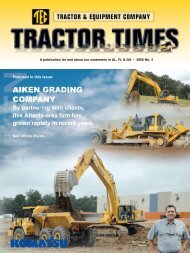CRAWFORD GRADING & PIPELINE, INC. - TEC Tractor Times
CRAWFORD GRADING & PIPELINE, INC. - TEC Tractor Times
CRAWFORD GRADING & PIPELINE, INC. - TEC Tractor Times
- No tags were found...
You also want an ePaper? Increase the reach of your titles
YUMPU automatically turns print PDFs into web optimized ePapers that Google loves.
INDUSTRY NEWSLOST REVENUEAnalysis shows proposed fuel-efficiency standardswould reduce highway fundingProposed new fuel-efficiency and emissionsstandards for everything from cars to light- andheavy-duty trucks could have a detrimentaleffect on transportation funding, according toan American Road and Transportation BuildersAssociation (ARTBA) analysis. It predicts thatrevenues could fall by a total of more than $75billion for state, federal and local highway,bridge and transit improvements.ARTBA says the new standards, announcedlate last July, would be the equivalent ofeliminating all federal highway funding fornearly two years. One proposal calls for anincrease to an average of 54.5 miles per gallon fornew cars and light trucks between 2017 and 2025.ARTBA’s analysis assumes the mpgrequirement will be phased in at 5 percentper year during that time frame. That is ontop of a current increase in fuel standards thatwas announced last year, which increases theaverage mpg increase from 28.3 to 34.1 by2016. ARTBA Vice President of Economics andResearch Dr. William Buechner estimates thatwould cost the Highway Trust Fund about $9billion, with another $65 billion or more lost bythe latest proposed standards.The Highway Trust Fund’s primary revenuesource is federal gas and diesel taxes collectedfrom motorists filling up their vehicles.Therefore, lower motor-fuel sales mean lessmoney in the coffers.New standards for medium- and heavy-dutytrucks, developed by the Department ofTransportation and the EPA with input from thetrucking industry, environmental groups andstate governments, are slated to go into effectbetween 2014 and 2018. Most tractor-trailerswill be required to reduce fuel consumptionand emissions by up to 20 percent by modelyear 2018. Heavy-duty pickups require about a15-percent reduction.The projection is that these new standardswill reduce oil consumption by 530 millionbarrels of oil, cut carbon emissions by about270 million metric tons and save an estimated$50 billion in fuel costs.“Like everyone else, we are supportiveof efforts to reduce carbon emissions andimprove fuel economy,” said ARTBA PresidentPete Ruane. “However, from a public-policyperspective, this is a classic case of the left handnot knowing what the right hand is doing.It’s irresponsible to advance such proposalswithout acknowledging and attempting tomitigate the adverse effect they would have onthe areas of federal responsibility, like makinginfrastructure improvements that improvesafety, reduce traffic congestion, create jobs andhelp grow the economy.” nProposed newfuel-efficiencystandards couldcost billions in lostrevenue that goestoward highway andother transportationfunding, according toindustry groups.


